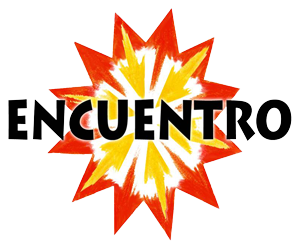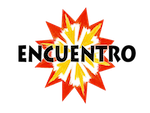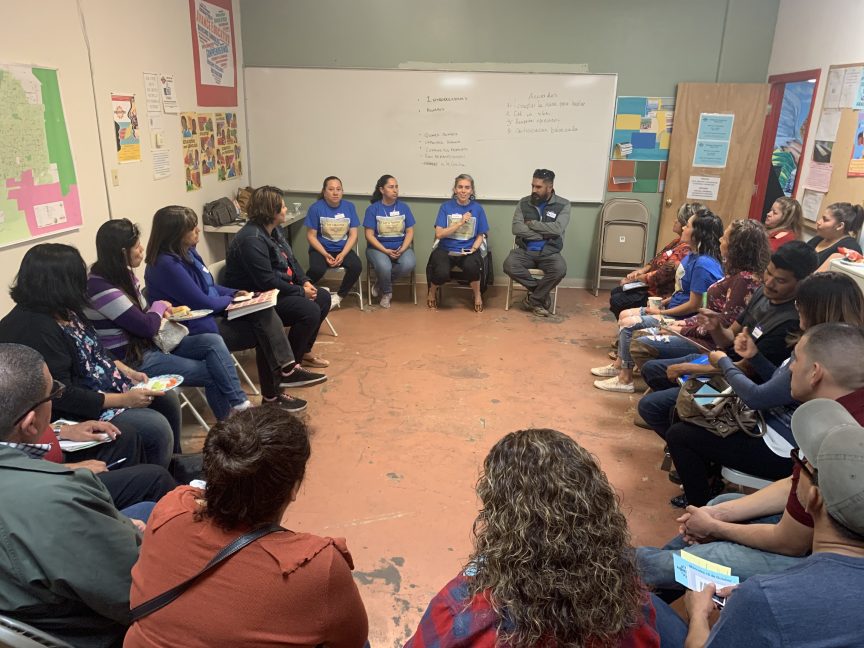
Diálogos Comunitarios 2019
Como cada año en el mes de Octubre, Encuentro lleva a cabo uno de sus eventos más importantes: Los Diálogos Comunitarios (DC). Los DC es un evento ya tradicional en Encuentro, lleno de información, recursos, empoderamiento y unidad. Este año no podía ser la excepción, pero antes de ahondar en el resumen los Diálogos 2019, conozcamos un poco más sobre la historia de este evento.
Every year in October, Encuentro holds one of its most important events: The Dialogos Comunitarios (DC). The DC is a traditional event in Encuentro, full of information, resources, empowerment and unity. This year could not be the exception, but before delving into this year’s summary, let’s learn a little more about the history of this event.
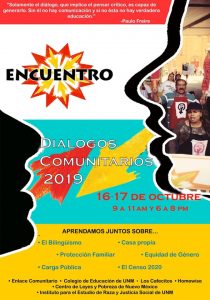
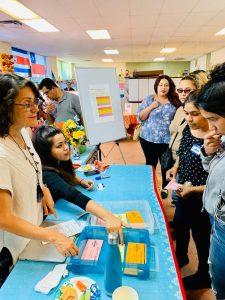 ¿Qué son los Diálogos comunitarios y cual es su objetivo?
¿Qué son los Diálogos comunitarios y cual es su objetivo?
Los diálogos comunitarios consisten en una serie de pláticas impartidas por invitados oradores de diferentes organizaciones sobre temas específicos.Las pláticas son impartidos a nuestros estudiantes durante sus horario de clase en el mes de octubre con el objetivo de seguir proveyendo oportunidades de información a nuestros estudiantes más allá de las clases que aquí ofrecemos, procurando siempre, que sea información útil, de su interés y para su bienestar.
What are the Dialogos Comunitarios and what is their objective?
The Dialogos Comunitarios consist of a series of talks given by guest speakers from different organizations on specific topics, and are shared with our students during their class schedule in October. Ensuring that the topics of discussion are those of interest, important for our students well-being, and useful information, the objective of our community dialogues is to keep providing informational opportunities to our students beyond the classes we offer.
¿De donde nace la idea de los Diálogos Comunitarios?
Los diálogos comunitarios se llevaron a cabo por primera vez en el año 2012 y nacieron de la necesidad de información que había en nuestra comunidad sobre diversos temas, además de que Encuentro vio en ellos una oportunidad más de lograr la justicia social y el empoderamiento a través de la información y conocimiento. En sus inicios, el evento era conocido como “Semana Comunitaria” y se invitaban a varias organizaciones a impartir talleres informativos durante las clases de Encuentro, pero eventualmente y debido al éxito, la “Semana Comunitaria” se convirtió también en un espacio de participación e inclusión, en el cual, nuestros estudiantes podian contar su testimonio, interactuar con el orador y participar de manera didáctica convirtiéndose así en “Diálogos Comunitarios”.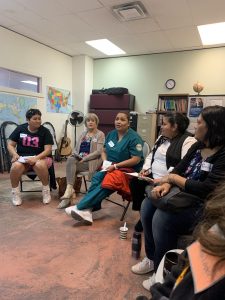
Los temas que se han impartido en la historia de los “Diálogos Comunitarios” han sido diferentes cada año, siempre diversos y del interés público como: “Las mujeres y el Trabajo Doméstico”, “Salud Mental en la Comunidad Inmigrante”, “Educación temprana”, “Derechos Laborales”, “Acoso Sexual”, entre otros.
Este año 2019, Encuentro contó con la presencia de 7 organizaciones de diferentes ámbitos quienes se dieron cita los días 16 y 17 de octubre en nuestras diversas clases para informar a nuestros estudiantes sobre temas tan importantes y actuales como El censo, El Bilingüismo, Compra de casa y más.
Where does the idea of Dialogos Comunitarios come from?
The community dialogues were held for the first time in 2012 and were born from the need for information in our community on various topics, in addition to those needs Encuentro observed from the students. The DC are also another opportunity to achieve social justice and empowerment through information and knowledge. In the beginning, the event was known as “Semana Comunitaria” where several organizations were invited to give informative workshops during our classes, but eventually and due to its success, the “Semana Comunitaria” also became a space for participation and inclusion, in which our students could tell their testimony, interact with the speaker and participate in a didactic way, thus becoming “Community Dialogues”.
The topics that have been taught in the history of “Community Dialogues” have been different every year, always diverse and of public interest such as: “Women and Domestic Work”, “Mental Health in the Immigrant Community”, “Early Education ”,“ Labor Rights ”,“ Sexual Harassment ”, among others.
This year 2019, Encuentro invited seven organizations from different fields who gathered on October 16 and 17 in our classes to inform our students about such important and current issues as The Census, Bilingualism, and more.
A continuación un resumen de lo que nuestros expositores dialogaron con nuestros estudiantes:
Below is a summary of what our exhibitors discussed with our students:
El CENSO 2020:
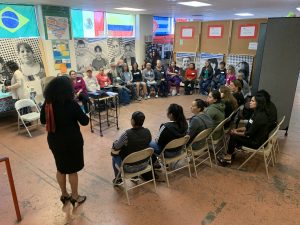
El Censo 2020 se acerca y este año contamos con la presencia de la Profesora Nancy López, Socióloga y Directora del Instituto Para el Estudio de “Raza” y Justicia Social de la Universidad de Nuevo México, quien nos informo todo lo relacionado con el censo: desde la logística hasta el porqué es tan importante para nuestra comunidad responder ya que de ello depende la cantidad de recursos que lleguen a nuestras comunidades.
The 2020 Census is approaching and this year we had the presence of Professor Nancy López, Sociologist and Director of the Institute for the Study of “Race” and Social Justice of the University of New Mexico, who informed us about everything related to the census: logistics, and why it is so important for our community to respond since the amount of resources that reach our communities depends on it.
El Bilingüismo y sus Ventajas:
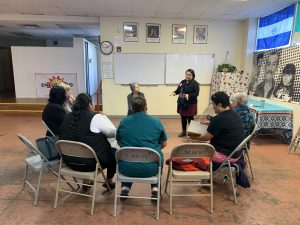
Este tema fue llevado de la mano de la Dra. Rebecca Blum-Martínez, de Colegio de Educación, Universidad de Nuevo México, con quien nuestros estudiantes platicaron sus experiencias como aprendices de un segundo idioma como es el ingles asi como sus testimoniales de cómo es la comunicación con las nuevas generaciones quienes dominan dos idiomas.
This topic was carried out by Dr. Rebecca Blum-Martínez, from the College of Education, University of New Mexico, with whom our students discussed their experiences as English language learners as well as their testimonials of how it is their communication with the new generations who master two languages.
Compra de Casa, un Sueño Alcanzable:
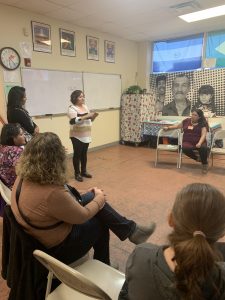
Para este tema, invitamos a la organización Homewise quienes se especializa en compra de casas y temas de credito. De la mano de Sandy Hernandez, nuestros estudiantes tuvieron la oportunidad de despejar sus dudas en cuanto a los requisitos para ser comprador de vivienda por primera vez e incluso, muchos de ellos se dieron cuenta que la compra de una casa es un sueño que se puede hacer realidad independientemente de su estatus!
For this subject, we invited the organization Homewise that specializes in home buying and related credit issues. Sandy Hernandez was our speaker and thanks to her information our students had the opportunity to clear their doubts about the requirements to be a first time home buyer and even many of them realized that buying a house is a dream that can come true regardless of status!
Relaciones Saludables:
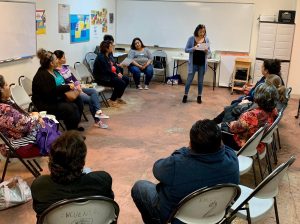
Enlace comunitario ha sido organización aliada de Encuentro por años, mismos en los que ha colaborado en los Diálogos Comunitarios. Este año, el area de prevencion de Enlace, vino a platicar con nuestros estudiantes puntos importantes sobre como mantener relaciones saludables con las personas que nos rodean, que es un conflicto, porque es bueno y cómo manejarlo. Un tema que resultó bastante interesante para nuestra comunidad, quienes enriquecieron el diálogo con sus experiencias personales.
Enlace Comunitario has been an Encuentro allied for years, same time in which they have collaborated in the Community Dialogues. This year, their prevention department, came to discuss with our students important points on how to maintain healthy relationships with the people around us, what is a conflict, and how to handle it. A topic that was quite interesting for our community, who enriched the dialogue with their personal experiences.
Carga Publica:
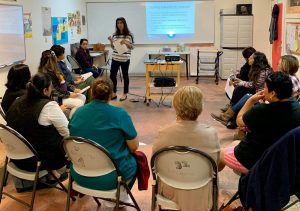
En esta ocasión, el Centro de Leyes y Pobreza de Nuevo México fueron los encargados de platicar con nuestros estudiantes sobre el tema de la carga pública, que significa, quienes se ven afectados por el uso de que beneficios, así como lo último en el tema. Hubieron bastantes preguntas que fueron despejadas en el momento por la abogada de inmigración Teague González.
On this occasion, the New Mexico Law and Poverty Center was in charge of talking with our students about the issue of public charge, which means, who are affected by the use of what benefits, as well as the latest in the subject . There were quite a few questions that were cleared at the time by immigration lawyer Teague González.
Plan de Protección Familiar:
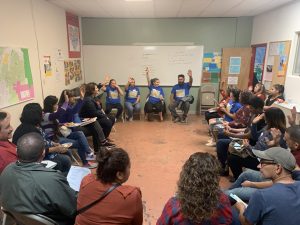
Con la presencia de la organización Los Cafecitos, nuestros estudiantes tomaron nota y despejaron sus dudas en cuanto al tema de protección familiar en caso de una deportación, los poderes notariales que necesitarás tener en mano así como los documentos necesarios para proteger a tu familia en caso de una eventualidad de esta índole.
With the presence of the Los Cafecitos organization, our students cleared their doubts regarding the issue of family protection in case of deportation, the notarial powers they will need to have on hand as well as the necessary documents to protect their family in case of an eventuality of this nature.
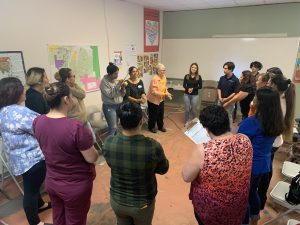 Juventud sin Violencia:
Juventud sin Violencia:
Tema desarrollado por la organización Enlace y su grupo de jóvenes, muchos de nuestros estudiantes encontraron interesante el aprender sobre como entender mejor a sus hijos adolescentes así como los consejos y estrategias que pueden poner en práctica con ellos para alejarlos de una relación violenta.
This topic was carried out by the organization Enlace Comunitario and their youth leaders, many of our students found interesting to learn how to better understand their teenage children as well as the tips and strategies they can put into practice with them to get them away from a violent relationship.
